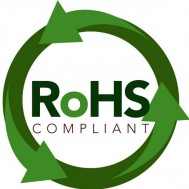As a manufacturer of sealing components for various industries, Apple Rubber must comply with the Restriction of Hazardous Substances (RoHS) European Environmental directive. But what does this compliance mean for manufacturers, and why is it important?
John Tranquilli, materials manager, helped us break it down.
What is RoHS?
The European Union (EU) legislation restricting the use of hazardous substances went into effect in February, 2003. RoHS regulations aim to restrict certain dangerous substances commonly used in electronic and electrical equipment—but applies to rubber products as well.
“As a component provider, we are asked to test our products so the complete assembly can be certified by our customers,” said Tranquilli. “Even though rubber compounds don’t typically use these substances, our products must be certified. “
The overall goal is to eliminate substances that are dangerous to people, as well as the environment.
What’s considered a hazardous substance?
Any RoHS compliance component must be tested for the presence of lead, cadmium, mercury, hexavalent chromium, polybrominated biphenyls and polybrominated diphenyl ethers.
“Standard compounds don’t use these substances in RoHS– so to validate, we test common polymer types,” Tranquilli noted. “Our test reports show that our rubber compounds show no detectable levels of heavy metals or flame retardants.”
Apple Rubber outsources testing to a certified lab, Intertek, to complete all RoHS testing. In a case where any substances were above the reported limits, we would then notify our customers and reformulate to remove any of the substances.
Below are the following polymer types that have been tested and certified:
What does this mean for customers?
Inadequately treated e-waste poses great environmental and health risks—so the objective of the process is to increase the recycling and reuse of such products. RoHS aims to increase the amount of appropriately treated e-waste, while reducing the volume that goes to disposal.
These substances create pollution and expose manufacturing employees and recyclers to health dangers. The RoHS regulation process aims to reduce administrative burdens and ensure coherency with newer policies—especially chemicals and legislative framework for products in the European Union.
Since Apple Rubber doesn’t use any of the RoHS substances, all rubber components are RoHS approved–making it easier for our customers to certify their final assembly.
“Even if manufacturers do not use these substances in their products, we still want to give our customer complete assurance that we are compliant to the standard,” Tranquilli noted. “We see environmental compliance a value added for our customer. Our goal is to provide a quality-molded product, seal or O-Ring, but also provide the certification to easily match our customers’ quality control requirements. “
For more information on RoHS, visit their website or our compliance page.
